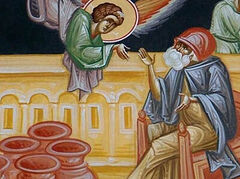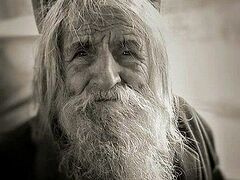In the Name of the Father, the Son and the Holy Spirit.
The Lord warns us today of how difficult it is for a man who is rich to enter the Kingdom of God.
Does it mean that the Kingdom of God is open only to destitute, to those who are materially poor, who lack everything on earth? No. The Kingdom of God is open to all who are not enslaved by possessions. When we read the first Beatitude, ‘Blessed are the poor in spirit for theirs is the Kingdom of Heaven’, we are given a key to this saying: the poor in spirit are those who have understood that they possess nothing of their own. We have been created as an act of God, loved into existence; God offers us communion with Him, to which we have no rights. All we are, all we possess is not our own in the sense that we have not made ourselves, we did not create what is seemingly ours—all that we are and have is love—the love of God and the love of people. And we cannot possess anything, because everything is a gift that escapes us the moment we want to have possession of it, and say, “It is mine”.
On the other hand, the Kingdom of God is really the kingdom of those who are aware that they are infinitely rich, because we can expect everything from divine love and from human love. We are rich because we possess nothing, we are rich because we are given all things. Thus, it is difficult for one who imagines that he is rich in his own right to belong to that kingdom in which everything is a sign of love, and nothing can be possessed, as it were—taken away from others; because the moment we say that we possess something which is not given us either by God or by human care, we subtract it from the mystery of love.
On the other hand, the moment we cling to anything we become slaves of it. I remember when I was young, a man told me, “Don’t you understand that the moment you have taken a copper coin in your hand and are not prepared to open your hand to let it go, you have lost the use of a hand, the use of an arm, the use of your body? Because all your attention will be concentrated on not losing this copper coin—the rest will be forgotten.”
Whether we keep in our hand a copper coin, or whether we feel rich in so many other ways—intellectually, emotionally, materially is irrelevant. We are prisoners, we have lost the use of a limb, the use of our mind, the use of our heart; we can no longer be free, and the Kingdom of God is a kingdom of freedom.
On the other hand, how difficult it is for one who has never lacked anything, who has always possessed more than he needs, to be aware of the poverty or the need of another—their material, emotional or intellectual poverty, or any other lack. It requires a great deal of understanding and sympathy, it requires from us that we should learn to be attentive to the movements of other people’s hearts and to their material needs in order to respond to them. There is an old Russian saying: A satisfied person no longer understands a hungry person. Who of us can say that we are hungry in any respect? And this is why we do not understand the needs of people—here, or of people beyond the confines of our congregation.
So, let us reflect on that. Poverty does not mean destitution. It means freedom from enslavement to an illusion that we are self-sufficient, self-contained, the creator of what we are and what we possess. It is also freedom from enslavement to what is given us, to make us stewards of God.
Let us reflect on this; because if we learn this, if we learn what Saint Paul said, that whether he is rich, whether he is destitute, he is equally rich because his richness is in God and in human love. Then we will be able, whether we possess material things or not, to be free of them, and to belong to God’s Kingdom—which is a Kingdom of mutual love, of mutual solidarity, of compassion for one another, of giving to one another what we were given freely. Amen.





